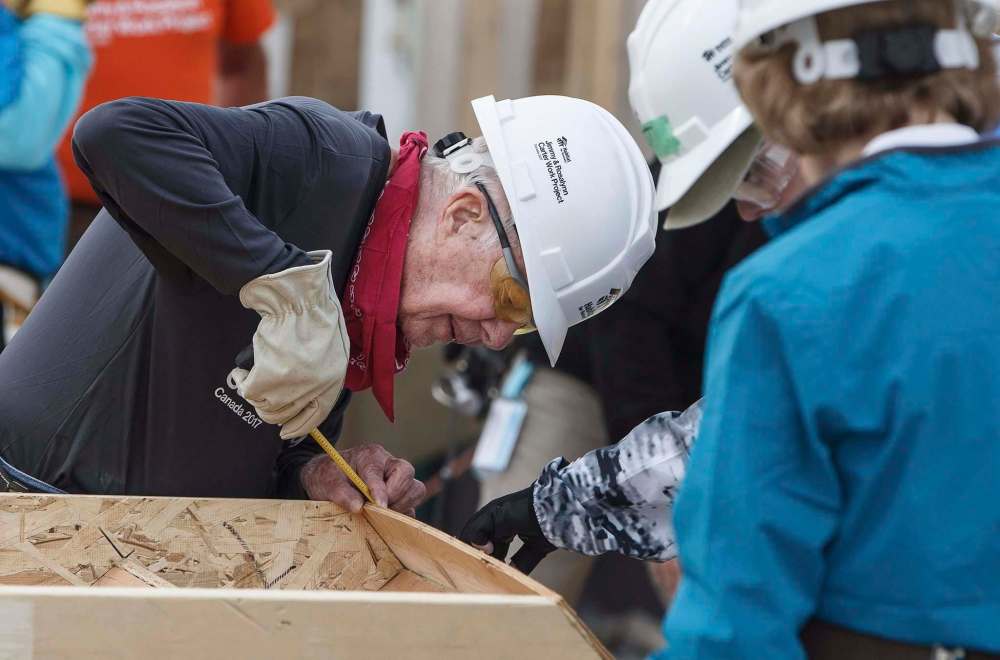A U.S. president worthy of emulation
Advertisement
Read this article for free:
or
Already have an account? Log in here »
To continue reading, please subscribe:
Monthly Digital Subscription
$0 for the first 4 weeks*
- Enjoy unlimited reading on winnipegfreepress.com
- Read the E-Edition, our digital replica newspaper
- Access News Break, our award-winning app
- Play interactive puzzles
*No charge for 4 weeks then price increases to the regular rate of $19.00 plus GST every four weeks. Offer available to new and qualified returning subscribers only. Cancel any time.
Monthly Digital Subscription
$4.75/week*
- Enjoy unlimited reading on winnipegfreepress.com
- Read the E-Edition, our digital replica newspaper
- Access News Break, our award-winning app
- Play interactive puzzles
*Billed as $19 plus GST every four weeks. Cancel any time.
To continue reading, please subscribe:
Add Free Press access to your Brandon Sun subscription for only an additional
$1 for the first 4 weeks*
*Your next subscription payment will increase by $1.00 and you will be charged $16.99 plus GST for four weeks. After four weeks, your payment will increase to $23.99 plus GST every four weeks.
Read unlimited articles for free today:
or
Already have an account? Log in here »
Hey there, time traveller!
This article was published 13/07/2017 (3075 days ago), so information in it may no longer be current.
Can you imagine Donald Trump coming to Winnipeg to pick up a hammer and build houses for poor people?
OK, you can stop laughing.
It’s an inconceivable image because Trump seems more like the type who would foreclose on poor people, not help them.

With Jimmy Carter arriving in Winnipeg today as a volunteer to help Habitat for Humanity build houses, it’s enlightening to compare the 92-year-old former U.S. president with the incumbent.
Resolving conflict: After his presidency ended in 1981, Carter established the Carter Center, committed to “waging peace” throughout the world through conflict resolution and the promotion of human rights issues.
Trump’s idea of conflict resolution is to shout, mock his opponents and never admit mistakes.
Caring for the planet: Carter promoted conservation while president, expanding the United States’ national parks system.
Trump has announced he will withdraw the U.S. from a global climate-change agreement that obliges countries to reduce their carbon emissions to ward off catastrophic global warming.
Literary output: Carter has written 29 books, including A Call to Action: Women, Religion, Violence and Power (2014) and Our Endangered Values: America’s Moral Crisis (2005).
Trump’s 1987 book, The Art of the Deal, was heavily ghost-written. Mostly, he tweets messages such as: “She was bleeding badly from a face-lift” (June 29) and “My use of social media is not Presidential — it’s MODERN DAY PRESIDENTIAL. Make America Great Again!” (July 1).
Racial differences: Carter said: “We become not a melting pot but a beautiful mosaic. Different people, different beliefs, different yearnings, different hopes, different dreams.”
Trump said: “Blacks and Hispanics are too busy eating watermelons and tacos to learn how to read and write.”
How they live: Carter and his wife, Rosalynn, live in Plains, Ga., (population 758) in the first and only home the Carters have owned, a ranch-style bungalow they bought in 1961.
Trump builds lofty tributes to himself with structures such as Trump Towers, Trump International Hotels and Trump Entertainment Resorts. His buildings are adorned with his name in big, shiny letters.
Their faith: Carter, who still teaches Sunday School at the Maranatha Baptist Church in Plains, has a lifetime of letting his Christian faith shape his actions, even when it meant he was unpopular or called naïve.
Trump, who professes to be Presbyterian, has said he does not ask for forgiveness and “does not bring God into that picture” when he makes mistakes, has tried to put money in the communion plate and was stuck for an answer when an interviewer asked for a favourite Bible verse.
About poor people: Carter said: “Globalization, as defined by rich people like us, is a very nice thing… you are talking about the internet, you are talking about cellphones, you are talking about computers. This doesn’t affect two-thirds of the people of the world.”
Referring to poor Mexicans illegally entering the U.S. to seek a better life, Trump said: “I will build a great wall — and nobody builds walls better than me, believe me — and I’ll build them very inexpensively. I will build a great, great wall on our southern border, and I will make Mexico pay for that wall.”
Historians and political scientists usually judge Carter as an unimpressive president, although his supporters point out he faced huge challenges during his four-year term, including the 1979-81 Iran hostage crisis, the 1979 energy crisis, the Three Mile Island nuclear accident and the Soviet invasion of Afghanistan.
But perhaps Carter’s lasting legacy is not his presidential term, but what he’s done since he left the White House. In his 36 years as a former president, the Carter Center has helped people in more than 80 countries by resolving conflicts, advancing democracy and human rights, preventing disease and improving mental health care. For 33 years, Carter and his wife have volunteered with Habitat for Humanity to build houses in places such as Winnipeg.
On several fronts, Carter is an inspiration.
His determination to help other people well into his senior years is a refreshing exception in a youth-obsessed society that often devalues older people and expects them to stay in rocking chairs.
The way he embodies his faith, humble but firm, is a welcome example for other people trying to keep a Christian worldview in a culture that seems more inclined to idolize money, sex and power.
Even for people who don’t share his religion, Carter is a role model who treats everyone with compassion, refuses to be compromised and does the right thing when no one is watching.
It’s about integrity. He’s a man of integrity, and that’s a challenge for the rest of us because integrity doesn’t depend on our station in life. None of us will be president of the U.S., but all of us can strive for the integrity shown by Jimmy Carter.
Carl DeGurse is a member of the Free Press editorial board.








